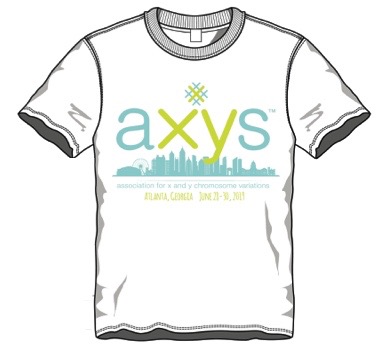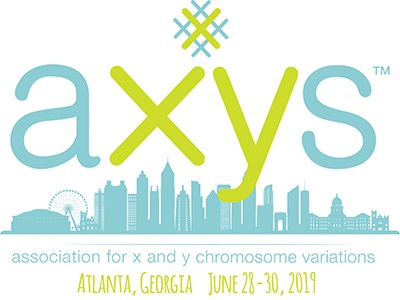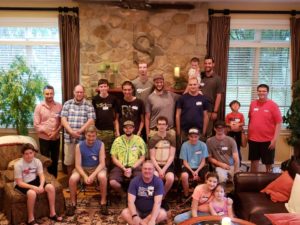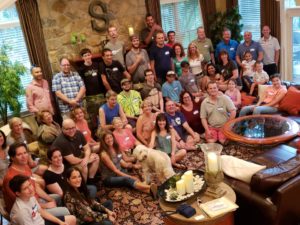 On August 11th, the Mid-Atlantic Support Group held a summer social get together in Chadds Ford, PA. The gathering consisted of 22 families, 21 individuals with a variation, and over 50 attendees total. Families came from Massachusetts, New York, New Jersey, Pennsylvania, Maryland, Delaware and California. Children and adults representing XXY, XYY, XXYY and Trisomy X enjoyed a cook-out and various indoor and outdoor games. For some, it was the first time ever meeting someone else with their condition. For others, it was an opportunity to catch up with friends.
On August 11th, the Mid-Atlantic Support Group held a summer social get together in Chadds Ford, PA. The gathering consisted of 22 families, 21 individuals with a variation, and over 50 attendees total. Families came from Massachusetts, New York, New Jersey, Pennsylvania, Maryland, Delaware and California. Children and adults representing XXY, XYY, XXYY and Trisomy X enjoyed a cook-out and various indoor and outdoor games. For some, it was the first time ever meeting someone else with their condition. For others, it was an opportunity to catch up with friends.
Ryan Bregante, who started the group Living with XXY, attended after having spent the week participating in a study at the NIH. He shared his positive experience with everyone interested, encouraging them to participate in research studies if they could. A number of the young adults were excited to have the opportunity to talk with Ryan face-to-face. It was also educational for Ryan to meet those with other conditions.
Mostly, it was an opportunity for people to talk and interact in a social environment with others just like them. Both parents and individuals with one of the conditions, found the afternoon to be an opportunity to learn new things, make new friends, and leave the rigors of daily life behind for a few hours.
This comment from one parent perhaps captures the essence of the day best of all. “I got very emotional watching Violet speak, for the first time ever in person, with another girl with Trisomy X. I remember being so scared when we first found out her diagnosis, not knowing anything about it and feeling so alone. Having the opportunity to watch her play with another girl with her condition was incredibly moving. They seemed to have an immediate connection with each other. Violet said on the way home that they “just started talking and were friends right away.”
Sometimes navigating through the ‘regular world’ can be challenging when people don’t understand why Violet acts the way she does. Being with a group of people who understand is very comforting. These kinds of meetings are so valuable both for opportunities like Violet’s, and also for the relationships built between parents with shared experiences.”
Another parent had this to say, “It was life changing for us as a family, and it will be an incredible support system for Carlos as he grows up. We are so grateful for all of you and what you do; for providing this platform to interact and support one another. Thank you so much for having us. Carlos is still talking about it.”
 And this from a teen, “I went to a meet and greet, where I could meet other men that can relate with me. I met a guy named Ryan who has a YouTube channel and explains what living with XXY is like. Even though I have XYY and most of the men at the meet and greet have XXY we all have experienced similar events in our lifetime. This has changed the way that I see myself, knowing that someone else understands how I feel. It was a moving experience for me.”
And this from a teen, “I went to a meet and greet, where I could meet other men that can relate with me. I met a guy named Ryan who has a YouTube channel and explains what living with XXY is like. Even though I have XYY and most of the men at the meet and greet have XXY we all have experienced similar events in our lifetime. This has changed the way that I see myself, knowing that someone else understands how I feel. It was a moving experience for me.”
And from his mom, “Me as a parent for the first time got to meet other parents with X and Y chromosome variations. It makes me feel like I’m not alone and we have so many similar stories, struggles, triumphs and love for our children. We can only move forward to help our children as a larger voice and making a person living with these variations feel valued and not ashamed for being different. This meeting was amazing to see how far awareness has come but we have so much more to do. Thanks for making the gathering possible. I will be at many more….”
As an added bonus, those attending contributed $300 towards food costs, which has been donated to AXYS on behalf of the group.

 T-shirts are white Hanes Tagless tees with the conference logo. T-shirt sizes Youth Extra Small to Adult XL are $10 each. T-shirt sizes Adult 2XL to 3XL are $12 each.
T-shirts are white Hanes Tagless tees with the conference logo. T-shirt sizes Youth Extra Small to Adult XL are $10 each. T-shirt sizes Adult 2XL to 3XL are $12 each.
 On August 11th, the Mid-Atlantic Support Group held a summer social get together in Chadds Ford, PA. The gathering consisted of 22 families, 21 individuals with a variation, and over 50 attendees total. Families came from Massachusetts, New York, New Jersey, Pennsylvania, Maryland, Delaware and California. Children and adults representing XXY, XYY, XXYY and Trisomy X enjoyed a cook-out and various indoor and outdoor games. For some, it was the first time ever meeting someone else with their condition. For others, it was an opportunity to catch up with friends.
On August 11th, the Mid-Atlantic Support Group held a summer social get together in Chadds Ford, PA. The gathering consisted of 22 families, 21 individuals with a variation, and over 50 attendees total. Families came from Massachusetts, New York, New Jersey, Pennsylvania, Maryland, Delaware and California. Children and adults representing XXY, XYY, XXYY and Trisomy X enjoyed a cook-out and various indoor and outdoor games. For some, it was the first time ever meeting someone else with their condition. For others, it was an opportunity to catch up with friends. And this from a teen, “I went to a meet and greet, where I could meet other men that can relate with me. I met a guy named Ryan who has a YouTube channel and explains what living with XXY is like. Even though I have XYY and most of the men at the meet and greet have XXY we all have experienced similar events in our lifetime. This has changed the way that I see myself, knowing that someone else understands how I feel. It was a moving experience for me.”
And this from a teen, “I went to a meet and greet, where I could meet other men that can relate with me. I met a guy named Ryan who has a YouTube channel and explains what living with XXY is like. Even though I have XYY and most of the men at the meet and greet have XXY we all have experienced similar events in our lifetime. This has changed the way that I see myself, knowing that someone else understands how I feel. It was a moving experience for me.”